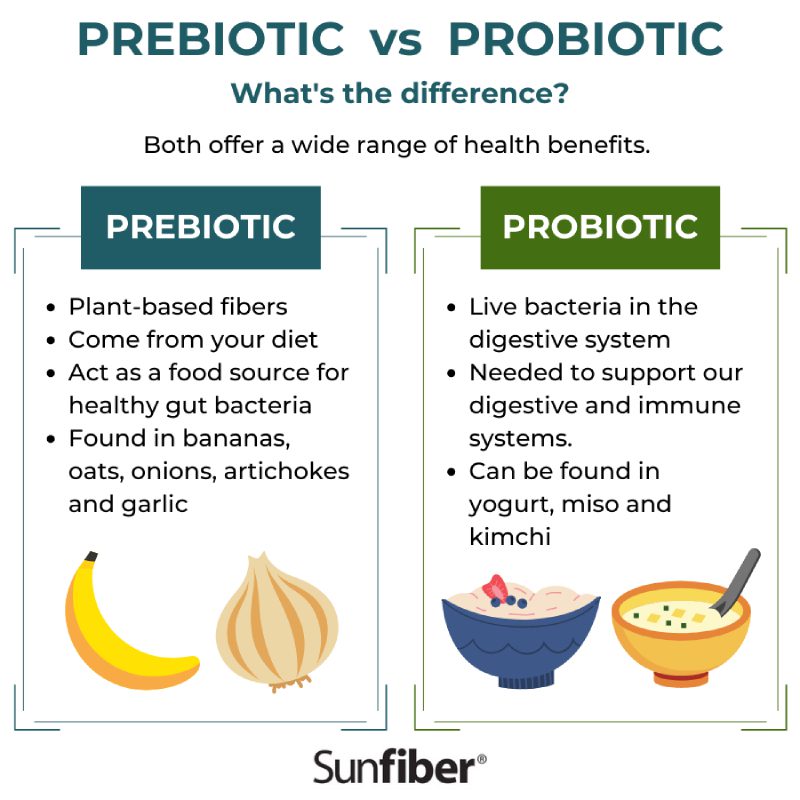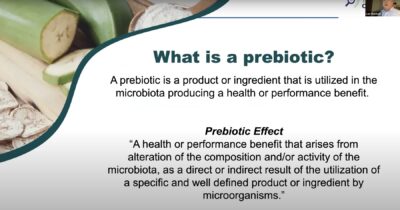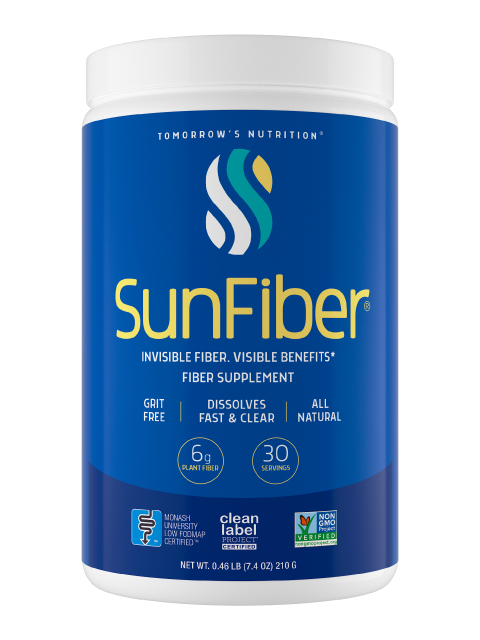Prebiotic Fiber: Everything You Need to Know

✓ Expert Review by:
Derek Timm, PhD, RDN
Prebiotic fiber supports healthy gut bacteria, benefitting your digestive health as well as your immune system. But not all dietary fiber is a prebiotic fiber, and not every prebiotic fiber is the same.
We’ve assembled helpful resources about prebiotic fiber, including its benefits, best sources and more.

Jump to Section
What is prebiotic fiber?
Prebiotics are non-digestible plant fibers that nourish the good bacteria (probiotics) in your digestive system, helping them grow and flourish. Prebiotic fiber can be found in plant-based foods that make up a healthy diet such as fruits, vegetables and whole grains.
Prebiotics vs. Probiotics
Prebiotics and probiotics can support our gut microflora and bring things back into balance. While they work in slightly different ways, both offer a wide range of health benefits.
- Prebiotics are plant-based fibers that come from your diet. Once consumed, they travel to your digestive tract, where they act as a food source for the healthy gut bacteria, stimulating their growth, resulting in a health benefit.
- Probiotics are the helpful (good) bacteria living in your gut. We need a variety of these healthy colonies to support our digestive system, our immune system and maybe even our mood.

How do you know if you need a prebiotic?
Some signs of fiber insufficiency include constipation, flatulence, frequent upset stomach and hemorrhoids. If you follow a gluten-free diet, you may be at an even greater risk for a dietary fiber deficiency since gluten-containing cereal grains often are good sources of fiber.
What is the daily prebiotic fiber amount?
There is no daily recommended value for prebiotics; a daily dose will help keep your gut happy and healthy. Target a dose scientifically shown to improve the gut microbiome, which is at least 5 grams per day.
What are the benefits of prebiotic fiber?
Prebiotics nourish the good bacteria in your gut, keeping the bacteria in your digestive system (your gut microbiome) in balance. New scientific findings are linking the gut microbiome with the immune system and potentially mood. That’s because the gut, with the help of good bacteria, can create the neurotransmitters serotonin and dopamine. When the gut is out of balance, you don’t feel well.
Some prebiotics may also benefit a number of gastrointestinal disorders such as occasional constipation, occasional diarrhea or Irritable Bowel Syndrome. They can also be helpful in supporting weight management because they help keep you fuller for longer. Prebiotics are also associated with supporting calcium absorption, which may benefit bone health.

What are the best sources of prebiotic fiber?
Prebiotic fiber can be found in many plant-based foods such as high-fiber fruits, vegetables and whole grains. Some of the best food sources include onions, garlic, leeks, soybeans and bananas.
However, only about 5% of American adults get enough fiber from the foods they eat. That means even if you eat a healthy diet, you probably are not getting the right amount of prebiotic fiber.
If you’re struggling to increase your fiber intake, some prebiotic fiber supplements can make it easier to meet your daily fiber requirements. Just be cautious about which prebiotic fiber supplement you choose. Some prebiotics, such as inulin, are rapidly fermented. That may cause an increase in gas, bloating and abdominal discomfort.
Look for prebiotic fiber supplements containing Sunfiber, because it will not cause excess gas or bloating. It delivers clinically substantiated health benefits, is non-GMO certified, low-FODMAP certified and organic.
How long does it take for prebiotics to work?
Human clinical studies using Sunfiber have demonstrated some benefits in as little as 14 days.
What is the science behind prebiotic fiber?
The gut microbiome is a complex ecosystem. Somewhere between 100-400 bacteria species reside in the gut. These bacteria use a fermentation process to help break down prebiotic fibers in the colon. This gives them energy and supports their growth.
This fermentation process also produces beneficial short chain fatty acids (SCFAs) acetate, propionate and butyrate. Of these, the most important SCFA is butyrate because it is used by cells in the colon for energy, which supports the colon’s barrier function.
Numerous human clinical studies show that prebiotic fiber produced from the guar bean is particularly helpful in normalizing stool as well as increasing levels of Bifidobacteria and Lactobacillus, two probiotic strains (good bacteria) commonly associated with healthful benefits.
Are there side effects of prebiotics?
Yes, there can be normal — but undesirable — gassy side effects when the fermentation process happens too rapidly. That is why some prebiotic fiber supplements can cause flatulence, bloating or stomach noises as gasses build up in the gastrointestinal system.
These side effects can generally be avoided by choosing a prebiotic fiber that ferments more slowly and is better tolerated. This maximizes the benefits and minimizes the negatives. Sunfiber ferments steadily, produces high amounts of beneficial butyrate and is well tolerated. It blends easily into most beverages, smoothies, yogurts and even cooked recipes without affecting food’s taste, aroma or texture.
Does prebiotic fiber cause gas?
Some prebiotic fibers that ferment rapidly can produce an excess of uncomfortable bloating and flatulence. This is less likely to happen with prebiotic fiber supplements that have a significantly slower fermentation rate.
Recommended Prebiotic Fiber Products
We recommend prebiotic supplements containing Sunfiber.
Sunfiber can be found in a growing number of stand-alone fiber supplement brands as well as a brand-name ingredient in many nutritional supplement formulas, including numerous options offered by Tomorrow’s Nutrition.
About Sunfiber
Sunfiber is a truly regulating soluble fiber that helps to normalize the digestive system. It is clinically shown to be effective at regulating occasional diarrhea and occasional constipation. Sunfiber is an excellent prebiotic for supporting digestive health and microflora balance. It is tasteless, colorless, odorless, gluten free, and 100% water-soluble.
Sunfiber starts with natural guar beans which are grown in fields that are not treated with chemicals. No preservatives are used or added during manufacturing. It is certified Kosher, Halal, vegetarian (not of any animal origin nor derivative), Non-GMO Project Verified and certified glyphosate residue free. All raw materials are kept free from GMOs and their derivatives throughout the production process.
Learn More About Prebiotic Fiber
Our blog answers additional information about the benefits of prebiotics.

What causes gas and how to deal with it

Prebiotic supplementation is trending

What is prebiotic fiber?

How does fiber support heart health?

Infographic: Sunfiber’s role in microbiome health

Sneaking more fiber into your diet may have another woman’s health benefit

Water and Fiber: How to address two common digestive shortfalls at once

How much prebiotic fiber should you eat daily?

Pilot study associates fiber intake with improved fertility

How to feed the right soluble fiber to your immune system

Whitepaper: the prebiotic effect of Sunfiber

Canadian viewers get tips on managing seasonal overindulgences
Final thoughts about prebiotic fiber
Prebiotic fiber is excellent for gut health. But not all dietary fiber is prebiotic fiber. Prebiotics come from plant-based foods such as fruits, vegetables and whole grains, and they act as a food source for the healthy gut bacteria, stimulating their growth.
While there is no daily recommended value for prebiotics; a daily dose of 5 grams should help keep your gut happy and healthy. Because some prebiotic fibers ferment rapidly, which can produce an excess of uncomfortable bloating and gas, we recommend choosing Sunfiber prebiotic because it has minimal unpleasant side effects.

